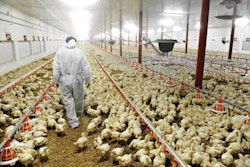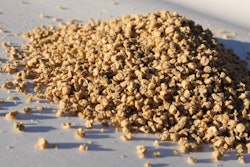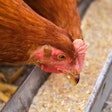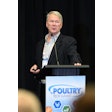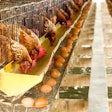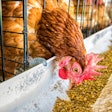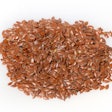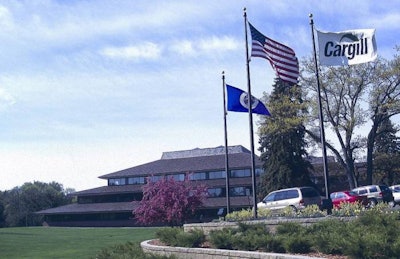
Cargill reported a 5 percent drop in revenues for the fourth quarter to $27.1 billion, and an 11 percent decline for the full fiscal year ended May 31, 2016, to $107.2 billion.
“We are looking ahead as we position our company for higher performance and sustained growth,” said David MacLennan, Cargill’s chairman and CEO. “We have more work to do, but where we have already made changes we are seeing improved results.”
MacLennan cited the broad earnings improvement in food ingredients and the reshaping of the company’s portfolio.
“We made important changes, adding capabilities essential to our customers’ success. This includes more than $3 billion in strategic acquisitions and new or expanded facilities, as well as nearly $2.4 billion in divestitures. These moves are making us more competitive in sectors where we intend to lead,” he said.
Cargill delivered strong performance in global animal nutrition, value-added protein and poultry in many regions. In addition, the company posted good results in grain and oilseeds in South America and China, and in food ingredients such as salt, starches, sweeteners and texturizers. Trading activities yielded mixed results, in part due to low volatility in agricultural commodity markets for most of the fiscal year. Stalled growth in several emerging economies also affected earnings.
Year in review
In recapping the year, MacLennan noted Cargill realized more than $425 million from innovation, primarily new products and services. It saved more than $200 million by increasing efficiency in its plants and supply chains, and by scaling up global shared services.
Throughout the year, Cargill brought together thought leaders and partners to address the linked challenges of food security, sustainability and nutrition. As part of its pledge to end deforestation, the company released a new forest policy and action plans to safeguard resources in critical supply chains. It joined with World Resources Institute to advance thinking on how global agriculture uses water and forest resources. Cargill also led Food Chain Reaction, a global food security simulation that gathered more than 60 leaders from different countries and organizations to explore solutions for the food systems of tomorrow.
This June, Cargill awarded more than $13 million in grants that will improve the lives of more than 1 million people in 15 countries. Among the implementing partners are CARE USA, The Nature Conservancy, Heifer International, Feeding America and Second Harvest Heartland.
“Working with customers and partners around the world, our Cargill team of 150,000 people in 70 countries is helping create the tomorrow we all want to see: one, where together, we thrive,” MacLennan said.
Segment results
Adjusted operating earnings in Animal Nutrition & Protein rose significantly in the fourth quarter. Full-year results edged below the prior year due to difficult market conditions globally in beef through the first three quarters, with some improvement in North America in the fourth quarter. Elsewhere, segment performance was strong, including in global animal nutrition, turkey and value-added protein in North America, and global poultry with the exception of China. Over the course of the fiscal year, Cargill acquired salmon nutrition leader EWOS; announced about $500 million in acquisitions and investments to grow its North American protein business; and partnered with Jollibee Foods, Asia’s largest foodservice company, to build a supply chain for specialty poultry products in the Philippines.
Full-year earnings in Origination & Processing decreased significantly from a year ago. Three years of good weather in major growing regions and sluggish global demand led to large stocks, weak prices and low volatility, all of which limited trading opportunities. Even so, the segment had strong performance in South America and China. The fourth quarter was not profitable, with results negatively affected by trading and timing effects in oilseed processing. Performance in South America and China, however, continued strong in the fourth quarter. Among the year’s investments, Cargill completed a new oilseed crush, refining and port complex in northeastern China and formed a joint venture to build a grain export terminal in Ukraine on the Black Sea. It also is undertaking significant expansions of its oilseed processing facilities in Três Lagoas, Brazil, and Wichita, Kansas. The company sold its crop insurance agency in the U.S., and exited from crop inputs in Central and Eastern Europe. In the fiscal 2017 first quarter, it agreed to sell its U.S. crop inputs business to Crop Production Services, a subsidiary of Agrium.


